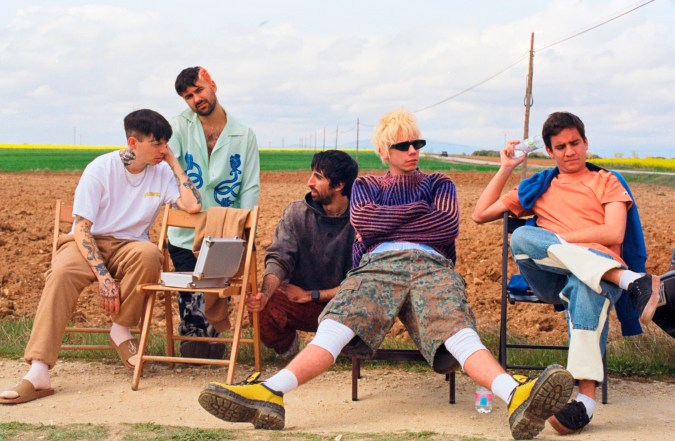The year was 2018, a pre-pandemic universe. France won the World Cup on Russian soil. Reggaetón was at one of its highest boiling points in the global mainstream. Culturally, it represented a key commercial moment. Everyone wanted to drink from the waters of reggaetón. In Nov. of that same year, Rosalía’s El Mal Querer became a must-listen album and one that you would share as an alarming WhatsApp chain with your loved ones. Suddenly, the music from a five-membered boy band formed by a trap artist and an indie band comes out of nowhere with a sound as fresh as the smell of a brand new Nintendo 64 on Christmas. Cupido was born, and “No Sabes Mentir” was released — a pop/rock song with Auto-Tune, lyrics that seemed more like viral heartbreak tweets, and melodies that reminded us of the best moments of the first decade of the Millenium.
“With just one song, Cupido was playing everywhere. It was as if you take a motorcycle to a neighborhood where there are no motorcycles,” Pimp Flaco tells Remezcla in a video call from his home in Madrid, Spain.
Cupido is a special band. A boy band that takes heartbreak and breaks it down for us in the most simple, prune, and direct way. All their lyrics seem to have the purpose of ending up in tweets or Instagram captions. The band is the union of Pimp Flaco, one of the most influential trap artists on the Spanish scene, and the bedroom pop band Solo Astra, also from Spain.
Since the release of their first album in 2019, Préstame Un Sentimiento, the band has been buzzing with sold-out concerts, and it became a leader in a scene that was perhaps a little tired of what was happening in the mainstream. Cupido borrows aesthetics from reggaetón, trap, and pop to transform them into rock/pop/punk songs with melodies full of Auto-Tune and guitar riffs that take us to the first decade of the 2000s, along with a singing much closer to trap than anything else. Cupido recognizes pop, consumes it, chews it up, and turns it into beautiful simple songs. An eternal heartbreak.

“I don’t like saying that we created a scene because, in the end, people have to know that. What happens is that, for whatever reason, we are not given visibility in Spain as we deserve. We have been banned from many media — there is a lot of jealousy and a plot against us. Evidently, we have created a scene because before Cupido, this sound didn’t exist. And now, many people, including famous people, have jumped on the bandwagon of Auto-Tune, drums, band, guitar, and no one talks about Cupido. They can’t deny it, but they don’t talk about it anywhere either. And it is evident that we have created a sound, and to say otherwise would be a lie,” reflects Pimp Flaco.
Cupido is that kind of band that you have to see live to understand the other part of their soul. They are an act that needs live music performances to complete the message. Their shows are like this kind of shamanic communion, where there is such dense energy in the air that you can touch it with both hands. It is common to see their audience waking up the next day with torn vocal cords and ordering chamomile tea with honey through Uber Eats.

With the eight songs on Préstame Un Sentimiento (a clear nod to the Simpsons), they conquered almost every existing festival in Spain. On that record, the melody and harmonic progressions are married to pop, and the phrasing is a seesaw that goes from side to side to the trap and punk common in Pimp Flaco’s solo work. It has influences from Gus Dapperton to the Brazilian icon Roberto Carlos. The lyrics capture the sensibilities of a generation that lives with its face glued to an iPhone: “Tu mamá y tu papá te hicieron la cara demasiado bien” (Your mom and dad made your face too well). “Hasta cuando estoy durmiendo sueño que estoy despierto y que tú estás aquí conmigo” (Even when I’m sleeping, I dream that I’m awake and you’re here with me). They seem made for 2022, when most of the public has more acceptance of this straightforward, ready-to-share-on-social-media type of lyrics than something more akin to Nick Cave, Bob Dylan, or Gustavo Cerati.

“It is evident that we have created a sound, and to say otherwise would be a lie.”
“Our lyrics are simpler, but that doesn’t mean they’re bad. Sometimes it’s harder to make a simple phrase that is good than a complicated phrase that is good. In the end, [songwriters] can put a lot of elements and technicalities into a complicated phrase that is good. People prefer a simple, catchy song that also says cool things. Feeling related is super important. That’s the formula nowadays: something simple, mainstream, but good. Otherwise, anyone could do it,” says Pimp Flaco.
But they are more than that soft and straightforward simplicity that characterizes them. On their second album, Sobredosis de amor, there are songs like “La pared,” which is perhaps closer to Oasis’ Britpop songs. Or the beautiful “Un cabrón con Suerte,” a heartbreak song that talks about not wanting to know who will be the next person your ex will be with.
In this same album, Cupido explores another layer of the possibilities that their sound and musical proposal have; a more thoughtful one in their live act and how their shows unfold. “I, personally, think that the change or evolution of our sound has had to do with the tour because the shows were very intense. I think we inadvertently wanted to do stadium rock and have people screaming [even more] and hear more power on stage, more pressure,” says Tony D, the band’s guitarist.

Similarly, this decision to move away from the first album is another way of not repeating himself artistically for the other guitarist Luichi Boy, who shares: “We are very restless. As we said before, we could have done the combination of ‘No Sabes Mentir’ and three or four more songs, but Cupido always has different songs. I remember an interview where Flaco was asked: ‘What are your goals for 2020?’ And he said: ‘Sound different from 2019.’”

Préstame Un Sentimiento and Sobredosis De Amor are two records that go beyond strapping on a guitar, turning on the Auto-Tune, and trying to make catchy songs. Cupido came to fill a void that existed in Spanish-language music. They created a scene in their country, quickly filled with musical proposals similar to theirs. Nowadays, it is quite common to see massive reggaetón or trap artists trying out other, more guitar-driven genres. “In the end, and don’t get me wrong, everything has been done. We are not here to invent anything. What happens is that there are moments in history in which a series of circumstances and coincidences occur, such as Cupido. A band with Auto-Tune, urban language, and a sound that targets all kinds of public,” concludes Pimp Flaco.




